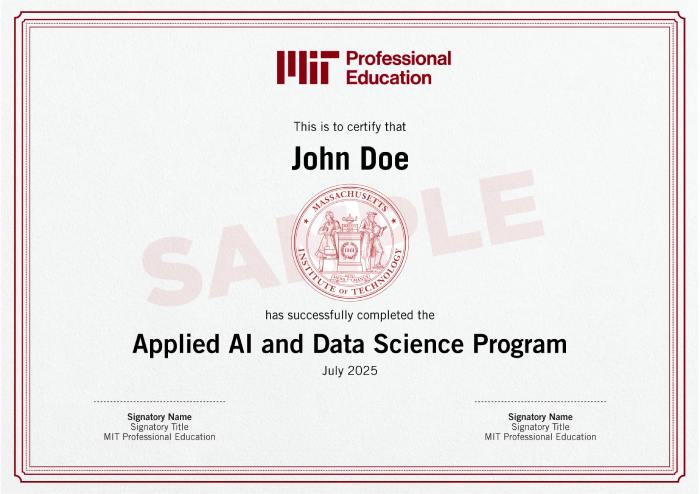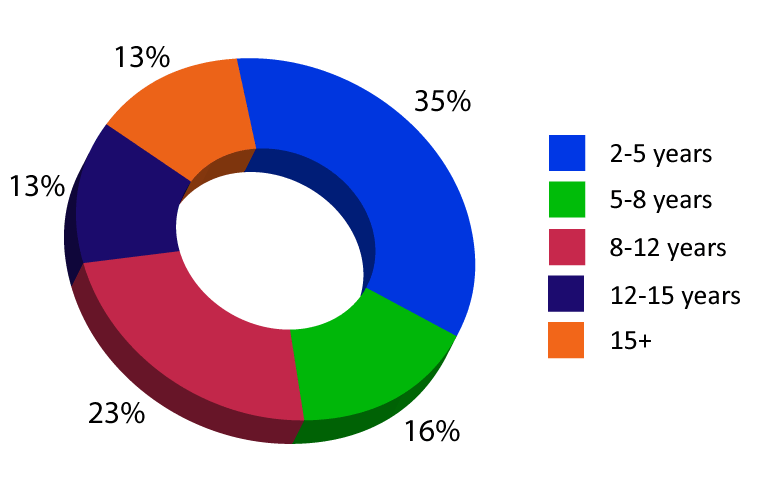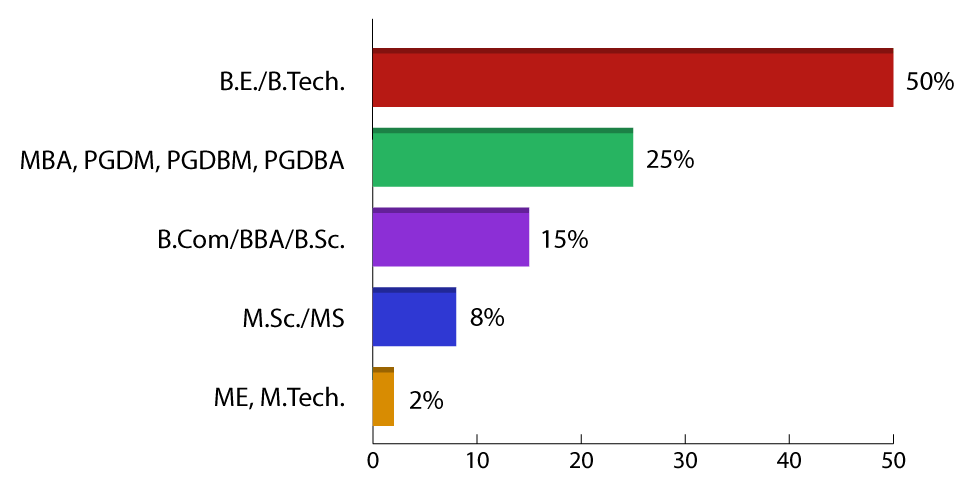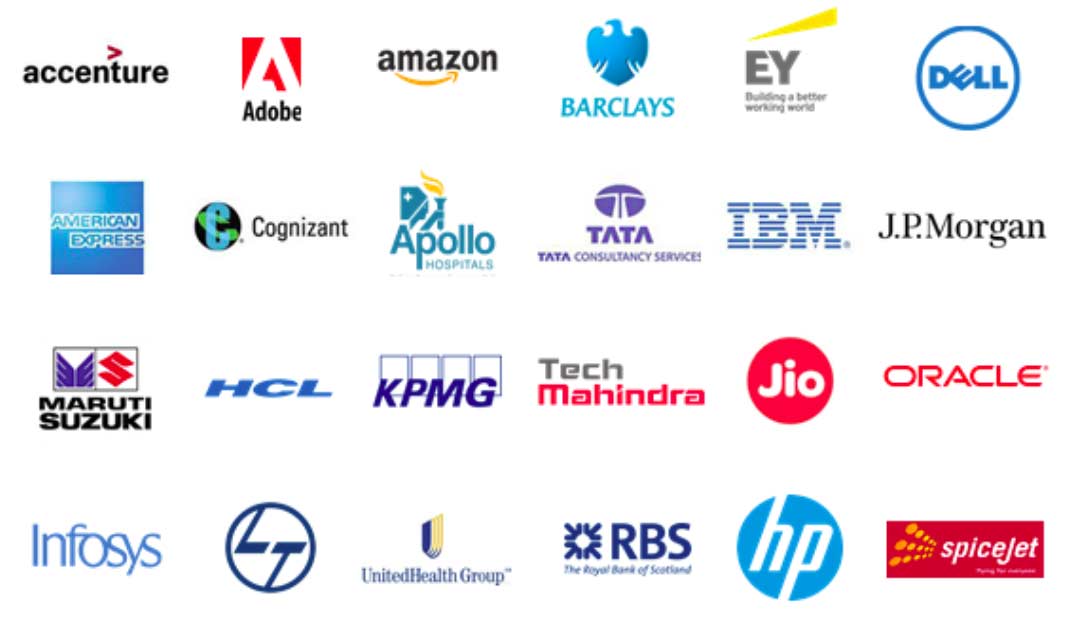Learn more about the course
Get details on syllabus, projects, tools, and more

Applied AI and Data Science Program
Application closes 29th Jan 2026
Distinctive features
-

Low-code approach
Build AI and data science workflows with minimal coding using intuitive tools. Perfect for professionals looking to advance their proficiency in AI without deep programming experience.
-

GenAI-infused curriculum
Covers the latest in Generative AI: Transformers, RAG, Prompt Engineering, and Agentic AI. Designed for real-world business applications.
Unlock real-world impact
Elevate your career in AI and data science
Build your AI and data science proficiency with the latest GenAI tools.
-
Apply AI and data science to solve real-world business problems
-
Learn to apply techniques across domains such as NLP, GenAI, Computer Vision, and Recommendation Systems
-
Learn effective data representation for predictive modeling
-
Create an industry-ready ePortfolio
Earn a certificate of completion from MIT Professional Education
Key program highlights
Why choose the Applied AI and Data Science Program
-

Live online sessions with MIT faculty
Engage in live online sessions with renowned MIT faculty for interactive insights.
-

Low-code approach
Build AI and data science skills using low-code tools and techniques, enabling hands-on learning without heavy coding.
-

Latest AI tech stack
Explore the latest Generative AI models, including Prompt Engineering and RAG modules.
-

Personalized mentorship by experts
Benefit from weekly online mentorship from Data Science and AI industry experts.
-

Build an industry portfolio
Work on 50+ case studies, projects, and a capstone project solving real business problems with AI.
-

Earn a globally recognized credential
Earn 16 CEUs and a certificate of completion from MIT Professional Education upon completion.
Skills you will learn
PYTHON
DATA ANALYSIS
DATA VISUALIZATION
MACHINE LEARNING
ARTIFICIAL INTELLIGENCE
COMPUTER VISION
DEEP LEARNING
GENERATIVE AI & PROMPT ENGINEERING
RETRIEVAL AUGMENTED GENERATION
AGENTIC AND ETHICAL AI
PYTHON
DATA ANALYSIS
DATA VISUALIZATION
MACHINE LEARNING
ARTIFICIAL INTELLIGENCE
COMPUTER VISION
DEEP LEARNING
GENERATIVE AI & PROMPT ENGINEERING
RETRIEVAL AUGMENTED GENERATION
AGENTIC AND ETHICAL AI
view more
Build your AI and data science proficiency
-
86% Execs Report
AI critical to firms
-
11.5 Mn+
Jobs in data by 2026
-
69% Global Leaders
Say AI #1 for growth
-
$103.5 Bn
Analytics market size
- Overview
- Learning Journey
- Curriculum
- Projects
- Tools
- Certificate
- Faculty
- Mentors
- Career support
- Fees
- FAQ

This program is ideal for
Data professionals and managers seeking AI-driven insights
-
Extracting Insights from Data
Professionals looking to uncover patterns and derive meaningful, actionable insights from large volumes of data and build solid AI and Data Science solutions.
-
Driving Strategic Impact
Professionals aiming to leverage AI and data science for business strategies, improve decision-making, and lead AI and Generative AI initiatives.
-
Building AI Expertise
Those interested in strengthening their understanding of AI, generative AI, and machine learning through hands-on projects and expert-led learning.
-
Deepening Technical Skills
Professionals with a background in technical management, business intelligence analysis, data science management, IT, management consulting, or business management, including data science and AI enthusiasts.
Ready to take the next step?

-

Explore a sample course from our faculty
-

Know more about the case-studies & projects
-

Experience a sample mentorship session with an lndustry expert
Application closes in:
1
Days
2
3
Hrs
3
8
Mins
3
2
Secs

-

Get a detailed program overview
-

Understand how this program can help achieve your career goals
-

Get more information about the enrollment process & next steps
50,000+ learners found this helpful
Syllabus designed for professionals
Designed by MIT faculty, the curriculum for the MIT Professional Education Applied AI and Data Science Program (formerly known as the Applied Data Science Program: Leveraging AI for Effective Decision-Making) equips you with the skills, knowledge, and confidence to excel in the industry. It covers key technologies, including artificial intelligence, machine learning, deep learning, recommendation systems, ChatGPT, applied data science with Python, generative AI, and more. The curriculum ensures you are well-prepared to contribute to artificial intelligence and data science initiatives in any organization.
-
Low-Code
Approach
-
Live Online Sessions
by MIT Faculty
-
10+
Emerging Tools and Technologies
Pre-Work: Introduction to Data Science and AI
This module is designed to help you get the most out of the program. We begin an introduction to foundational topics in Python programming, statistics, the Data Science lifecycle, and the evolution of AI and Generative AI. This module is designed to prepare all learners, regardless of prior experience, to confidently engage with the comprehensive curriculum ahead.
- Introduction to the World of Data
- Introduction to Python
- Introduction to Generative AI
- Applications of Data Science and AI
- Data Science Lifecycle
- Mathematics and Statistics behind DS and AI
- History of DS and AI
Weeks 1-2: Foundations – Python and Statistics
In this module, you will build essential programming and statistical skills. Learn to manipulate, visualize, and analyze datasets using:
- NumPy arrays and Functions
- Pandas Series and DataFrames
- Pandas Functions
- Saving and loading datasets using Pandas
- Data Visualization using Seaborn, Matplotlib, and Plotly
- Introduction to Inferential Statistics
- Fundamentals of Probability Distributions
- The Central Limit Theorem
- Hypothesis Testing
- Univariate Analysis
- Bivariate Analysis
- Missing Value Treatment
- Outlier Treatment
Week 3: Data Analysis and Visualization
In this module, you will learn unsupervised learning and dimensionality reduction techniques for pattern discovery.
- Understanding Classification and Clustering Methods
- Supervised Learning
- K-Means Clustering
- Dimensionality Reduction Techniques: PCA and t-SNE
Week 4: Machine Learning
In this module, you will build foundational machine learning models and understand their evaluation.
- Introduction to Supervised Learning
- Linear and Non-Linear Regression
- Causal Inference
- Regression with High-Dimensional Data
- Regularization Techniques
- Model Evaluation
- Cross-Validation
- Bootstrapping
Week 5: Revision Break
Week 6: Practical Data Science
In this module, you will apply real-world techniques in classification, ensemble learning, and forecasting.
- Introduction to Classification
- Logistic Regression
- Decision Trees
- Random Forest
- Type 1 Error & Type 2 Error in Classification Problems
- Hypothesis Testing
Week 7: Deep Learning
In this module, you will explore neural networks and their applications in computer vision and language processing.
- Introduction to Deep Learning
- Neural Network Representations (One Hidden Layer, Hidden Neurons, Multi-class Predictions)
- Introduction to Computer Vision (ANN vs CNN, Basic Terminologies, CNN Architecture)
- Transfer Learning
- Hypothesis Testing
Week 8: Recommendation Systems
In this module, you will design intelligent systems for personalization using a variety of recommendation techniques.
- Introduction to the Recommendations
- Content-Based Recommendation Systems
- Collaborative Filtering & Singular Value Thresholding
- Matrix Estimation Meets Content-Based
- Matrix Estimation Over Time
Week 9: Project Week
In this module, you will work independently on a hands-on project that allows you to apply program concepts to a domain of your choice.
Week 10: Generative AI Foundations
In this module, you will understand the architecture, evolution, and foundations of Generative AI.
- Origins of Generating New Data
- Generative AI as a Matrix Estimation Problem
- LLM as a Probabilistic Model for Sequence Completion
- Prompt Engineering
Week 11: Business Applications of Generative AI
In this module, you will learn how Generative AI and Agentic AI can drive business transformation.
- Natural Language Tasks with Generative AI
- Summarization, Classification and Generation
- Retrieval Augmented Generation (RAG)
- Agentic AI
Weeks 12–14: Capstone Project
For your Capstone Project, you will solve a real-world business challenge using techniques from across the program. Projects are guided and evaluated by mentors and reviewed by industry experts.
Module 1 - Introduction to Generative AI
The module covers :
- Overview of ChatGPT and OpenAI
- Timeline of NLP and Generative AI
- Frameworks for understanding ChatGPT and Generative AI
- Implications for work, business and education
- Output modalities and limitations
- Business roles to leverage ChatGPT
- Prompt engineering for fine-tuning outputs
- Practical demonstration and bonus section on RLHF
Module 2 - ChatGPT: The Development Stack
The module covers :
- Mathematical Fundamentals for Generative AI
- VAEs: First Generative Neural Networks
- GANs: Photorealistic Image Generation
- Conditional GANs and Stable Diffusion: Control & Improvement in Image Generation
- Transformer Models: Generative AI for Natural Language
- ChatGPT: Conversational Generative AI
- Hands-on ChatGPT Prototype Creation
- Next Steps for Further Learning and understanding
Work on hands-on projects and case studies
Engage in practical projects and program-specific case studies using emerging tools and technologies across sectors
-
50+
Case Studies
-
2 Projects
Industry-Relevant
-
Capstone Project
Hands-on Learning
Master in-demand AI and Data Science tools
Benefit from hands-on experience with 10+ top AI and Data Science low-code tools
Earn a Professional Certificate in Applied AI & Data Science
Get a certificate of completion from MIT Professional Education and showcase it to your network

* Image for illustration only. Certificate subject to change.
Learn from MIT faculty
Interact with our mentors
Interact with dedicated and experienced AI and data science experts who will guide you through your learning journey
Get industry-ready with dedicated career support
-
Get dedicated career support
Access personalized guidance to strengthen your professional brand.
-
1-on-1 career sessions
Interact with industry professionals to gain actionable career insights.
-
Resume & LinkedIn profile review
Showcase your strengths with a polished, market-ready profile
-
Build your project portfolio
Build an industry-ready portfolio to showcase your skills
Course fees
The course fee is USD 3,900
Advance your career
-

Apply AI and data science to solve real-world business problems
-

Learn to apply techniques across domains such as NLP, GenAI, Computer Vision, and Recommendation Systems
-

Learn effective data representation for predictive modeling
-

Create an industry-ready ePortfolio
Registration process
Our registrations close once the requisite number of participants enroll for the upcoming batch. Apply early to secure your seat.
-

1. Fill application form
Register by completing the online application form.
-

2. Application screening
A panel from Great Learning will assess your application based on academics, work experience, and motivation.
-

3. Join program
After a final review, you will receive an offer for a seat in the upcoming cohort of the program.
Eligibility
- Exposure to computer programming and a high school-level knowledge of Statistics and Mathematics
Batch start date
-
Online · 21st Mar 2026
Admission closing soon
Frequently asked questions
What is the Applied AI and Data Science Program offered by MIT Professional Education?
Learners gain access to mentorship from AI and Data Science experts across top global organizations. The curriculum spans Machine Learning, Deep Learning, Computer Vision, Recommendation Systems, and Generative AI modules, including Prompt Engineering, Retrieval-Augmented Generation (RAG), and Agentic AI. Learners will work extensively with high-demand tools like Python, TensorFlow, and ChatGPT.
Upon fulfilling the program’s requirements, learners receive a Certificate of Completion by MIT Professional Education and 16 Continuing Education Units (CEUs), attesting to their ability to leverage AI and Data Science for strategic influence across industries.
Is it necessary to bring my own laptop?
Is the program completely virtual?
How will my performance in the program be assessed?
What is the duration of this Applied AI and Data Science certificate program?
Will I receive a transcript or grade sheet after completion of the program?
Learners receive marks on each assessment to evaluate understanding and module performance, which determines eligibility for the certificate. Upon successful completion of all modules, you will receive a Certificate of Completion from MIT Professional Education.
What certificate will I receive after completing the Applied Data Science Program from MIT Professional Education?
Upon successfully completing this program, learners will secure a professional certificate in Applied Data Science from MIT Professional Education.
What will happen if I can’t make it to a live session?
Who will teach this Applied AI and Data Science Program?
What languages and tools will I learn in this program?
During this program, learners will gain proficiency in the most in-demand programming languages and tools, including Python, NumPy, Keras, TensorFlow, DALL·E, and Scikit-Learn, among others.
What is unique about this Applied AI and Data Science course syllabus?
This course syllabus is designed by considering the following aspects:
- Expertly crafted by MIT faculty: The curriculum is developed to provide learners with industry-relevant tools and techniques and apply them to real-world problems.
- Industry-relevant curriculum: With the addition of Generative AI modules on Prompt Engineering, Retrieval Augmented Generation (RAG), and Agentic AI.
- Comprehensive AI and Data Science coverage: Equips learners with essential techniques to tackle complex problems and become data-driven decision-makers.
- Core concepts: Covers Data Analysis, Data Visualization, Machine Learning, Deep Learning, and Neural Networks.
- Recommendation systems: Explains the theory and applications of recommendation systems across various sectors.
What is the program structure?
- 2 Weeks: Foundational courses on Python and Statistical Science
- 8 Weeks: A core curriculum that includes practical applications, featuring 27+ hours of live online sessions led by MIT faculty and industry experts, with hands-on problem-solving.
- 1 Week: Project submissions
- 3 Weeks: Final, integrative capstone project
What are the benefits of choosing this Applied AI and Data Science course from MIT Professional Education?
This course is an excellent choice for those seeking knowledge and skills in Applied AI and Data Science. The benefits of choosing this course from MIT Professional Education are as follows:
- Learn from MIT Faculty: Get insights from 27+ hours of live online sessions by world-renowned MIT faculty, who translate cutting-edge research into practical applications across AI and Data Science.
- Receive Mentorship from Industry Experts: Receive mentorship from expert AI and Data Science professionals at
world-leading companies.
- Latest AI Tech Stack: Through real-world case studies, hands-on projects, and a curriculum infused with the latest advancements in Artificial Intelligence and Generative AI, learn to apply cutting-edge tools and frameworks, including ChatGPT, Hugging Face Transformers,
TensorFlow, OpenCV, and more.
- Build an Industry-Ready Portfolio: Work on 50+ case studies, multiple hands-on projects, and a Capstone Project focused on solving real business problems using AI, ML, deep learning, and Generative AI tools.
- Earn a Globally Recognized Credential: On successful completion of the program, earn 16 Continuing Education Units (CEUs) and a Certificate of Completion by MIT Professional Education.
What is the ranking of the Massachusetts Institute of Technology (MIT)?
MIT is ranked #1 university in the world (QS World University Rankings) in AI and Data Science and the #2 national university in the U.S. (U.S. News & World Report). MIT Professional Education's programs reflect this leadership by integrating cutting-edge concepts and practical skill-building in these domains, enabling professionals to make data-driven decisions and lead digital transformation.
What is the Applied Data Science Program offered by MIT Professional Education?
The MIT Professional Education Applied Data Science Program is an all-encompassing course tailored to meet the learning needs of professionals seeking to advance their careers, tackle complex problems with innovative solutions, and contribute to a better future.
The program combines state-of-the-art online technology with traditional classroom instruction, fostering participation and teamwork and improving learning outcomes. Over 12 weeks, participants can enhance their data analytics skills by profoundly understanding the theories and practical applications of cutting-edge techniques, including supervised and unsupervised learning, regression, time-series analysis, neural networks, recommendation engines, and computer vision.
Why should I choose this Applied AI and Data Science Program from MIT Professional Education?
With over 70 years of experience delivering advanced programs for professionals, MIT Professional Education brings the Institute’s pioneering research and applied science directly to global learners, translating academic excellence into real-world impact. The Applied AI and Data Science Program is designed and delivered by MIT professors, reflecting the most current research emerging from MIT’s labs and centers. Upon program completion, learners earn a globally recognized Certificate of Completion by MIT Professional Education, backed by MIT’s rigorous standards and global reputation.
What is the required weekly time commitment?
What will the timing of the live virtual sessions be?
Are there any prerequisites for this Applied AI and Data Science Program from MIT Professional Education?
What if I do not have the required programming and statistics experience?
MIT Professional Education is collaborating with Great Learning to provide pre-course content to help you understand the fundamentals of programming (Python) and statistics. However, learners are expected to dedicate extra time to complete programming assignments and fully engage with the course material.
Can my employer cover the program fee?
We welcome corporate sponsorships and can help you through the process.
[For more information, please write to us at adsp.mit@mygreatlearning.com or +1 617 468 7899]
Are there any extra costs associated with buying books, virtual learning resources, or license fees?
What is the course fee to pursue this Applied AI and Data Science Program?
What are my payment options?
Candidates can pay the course fee through Bank Transfer and Credit/Debit Cards. They can also avail PayPal payment options.
For further details, please get in touch with us at adsp.mit@mygreatlearning.com.
What is the refund policy for this program?
- Dropout requests received within 7 days of enrollment and more than 42 days prior to the commencement of the program will incur no fee. Any payment received will be refunded in full.
- Dropout requests received more than 42 days prior to the program but more than 7 days after the acceptance are subject to a cancellation fee of USD 250.
- Dropout requests received 22-41 days prior to the commencement of the program are subject to a cancellation fee equal to 50% of the program fee.
- Any dropout requests received fewer than 22 days prior to the commencement of the program are subject to a cancellation fee equal to 100% of the program fee.
- No refund will be made to those who do not engage in the program or leave before completing a program for which they have been registered.
What is the application process to pursue this online Applied AI and Data Science Program from MIT Professional Education?
Step-1: Application Form
Register by completing the online application form.
Step-2: Fill Application Screening
A panel from Great Learning will assess your application based on academics, work experience, and motivation.
Step-3: Join Program
After a final review, you will receive an offer for a seat in the upcoming cohort of the program.
What is the deadline to enroll in this Applied Data Science Program?
The applications go through a rolling process that closes when the required number of seats in the cohort is filled. Please submit your application as soon as possible to boost your chances of getting a seat.
What are the other benefits that candidates acquire upon taking up this program?
What is applied data science?
How do you become an applied data scientist?
You can become an Applied Data Scientist by:
-
Earning a bachelor’s degree in computer science, IT, mathematics/statistics, or any other Data Science related fields
-
Gaining professional experience in Data Science by working at any organization
-
Enrolling in an Applied Data AI and Science Program from top universities, such as MIT, UC Berkeley, etc.
How much Salary can an applied data scientist earn?
What is the demand for Applied data scientists?
What are the various applications of Data Science and AI?
Data Science Applications:
- Healthcare: Machine learning and predictive analytics is used to analyze patient data, improve diagnostics, optimize treatment plans, and enhance operational efficiency in hospitals and clinics.
- Banking & Finance: Statistical modeling and AI-driven algorithms detect fraud, assess risk, and personalize financial products, driving smarter decision-making and secure operations.
- E-commerce: Predictive analytics and recommendation systems optimize pricing, forecast demand, personalize customer experiences, and streamline supply chain operations.
- Transportation: Data-driven algorithms are employed for route optimization, fleet management, and autonomous vehicle systems to reduce costs, improve safety, and increase efficiency.
- Manufacturing: Predictive maintenance and quality control models minimize downtime, improve production processes, and enhance operational productivity.
AI Applications:
- Healthcare: AI enhances healthcare by enabling more accurate diagnostics through medical imaging, improving treatment plans with predictive analytics, and optimizing hospital operations using intelligent scheduling and resource allocation systems.
- Banking and Finance: AI in finance is revolutionizing fraud detection with real-time anomaly detection algorithms, improving customer service through AI-driven chatbots, and optimizing investment strategies via predictive financial modeling and algorithmic trading.
- E-commerce: AI drives personalization in e-commerce through recommendation systems, boosts supply chain efficiency with demand forecasting models, and refines pricing strategies using dynamic pricing algorithms based on market trends and customer behavior.
- Manufacturing: AI is reshaping manufacturing with predictive maintenance systems that analyze equipment health to prevent breakdowns, automated quality control using computer vision, and process optimization algorithms to streamline production workflows.
- Transportation and Logistics: AI in logistics uses route optimization algorithms to reduce delivery times, enhances fleet management with predictive analytics to improve fuel efficiency, and powers autonomous vehicles for safer and more efficient transportation systems.
- Retail: Retailers apply AI for inventory management using demand prediction models, optimize customer experience with personalized marketing campaigns, and implement AI-powered checkout systems to streamline transactions and enhance service speed.
- Energy: AI in energy uses smart grid systems for efficient energy distribution, integrates predictive maintenance for energy infrastructure, and aids in renewable energy optimization through algorithms that predict generation patterns based on weather data.
- Telecommunications: In telecommunications, AI is used for network optimization, predictive maintenance to avoid service disruptions, and AI chatbots to enhance customer support and improve user engagement.
Is Applied Data Science worth it?
Applied Data Science is an essential skill that can help you stand out in the job market and give you the knowledge and skills to help your organization stay ahead of the competition. It can open the door to more job opportunities, more efficient systems, and better decision-making.
Are Data Science and Applied Data Science the same?
Data Science is a broad field that involves techniques and processes for gathering and analyzing data to generate insights, predictions, and strategies. It includes topics such as machine learning, artificial intelligence, and statistics.
Applied Data Science is the practice of using Data Science principles in different areas, such as e-commerce, healthcare, finance, and marketing. It focuses on utilizing data-driven approaches to design, develops, and deploy solutions to complex business problems. It focuses on the practical application of Data Science principles to derive insights and add value to different sectors of the economy.
What is Applied AI?
Applied AI focuses on using artificial intelligence and machine learning techniques to solve real-world problems in business, healthcare, technology, and other sectors. It includes developing AI models that can automate tasks, make predictions, enhance user experiences, and optimize processes across industries.
How will Applied AI help my career?
AI is transforming industries by automating processes, enhancing decision-making, and improving efficiency. By learning Applied AI, you will be able to design, deploy, and manage AI-driven solutions that add substantial value to businesses. This field offers immense growth opportunities and the potential to lead the future of technology.
How do you become an Applied AI Specialist?
To become an Applied AI specialist, you should:
- Have a strong foundation in computer science, machine learning, and data science principles.
- Gain hands-on experience by working on real-world AI projects.
- Take specialized courses in AI technologies, including natural language processing (NLP), computer vision, and reinforcement learning.
- Enroll in a program like Applied AI from top universities to develop your skills in designing and implementing AI solutions.
Batch Profile
The PGP-Data Science class consists of working professionals from excellent organizations and backgrounds maintaining an impressive diversity across work experience, roles and industries.
Batch Industry Diversity

Batch Work Experience Distribution

Batch Education Diversity

The PGP-Data Science learners come from some of the leading organizations.




 Speak with our expert
Speak with our expert




























